February 1993, Oceanview Bible Camp, parish of St. Elizabeth, Jamaica, West Indies

Table of Contents
“Is it going to rain, Dad?” I asked.
This was a question of utmost importance to my eleven-year-old mind. After living in Jamaica for several months, we had learned that daily life was highly weather-dependent here in the agricultural community of Yardley Chase, St. Elizabeth.
Everyone walked to church, or caught a ride in our fourteen-passenger minibus since we owned one of the only two vehicles in our local church. If it rained anything more than a drizzle, no one would come to church because they would arrive soaked.
Many Jamaicans were firmly convinced that getting soaked would lead to them catching a cold, so it wasn’t worth the risk. Rain before church meant certain cancellation.
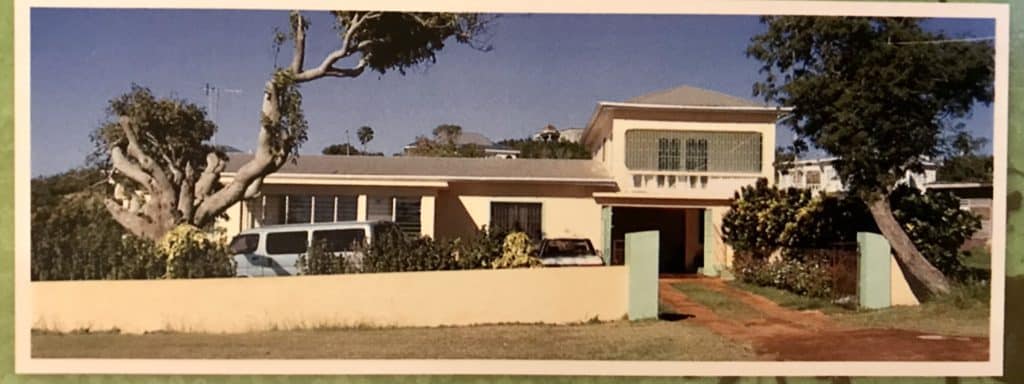
“Well, it’s not raining yet,” was Dad’s straightforward response.
I sighed and picked up my Bible carrying case, containing my Bible, hymnbook and head covering. I knew that was Dad’s way of saying that we were going to start picking people up, half an hour before church started. Mom, Dad, Philip, Joel, Beth and I climbed into the van and began driving around.
Transportation to and from church
Sometimes we would walk to church while Dad made the rounds. We knew that over twenty people would eventually be in the van by the time Dad arrived at the church building. But with rain threatening, none of us wanted to risk getting soaked on the mile-long walk.
I had been hoping that it would start raining so we could stay home. Then I could re-read one of my Nancy Drew novels. But no such luck.
Dad made several stops at different church members’ homes. With each stop, more people climbed in. Finally we came down the hill from Top Hill direction and arrived at our little one-room church building.
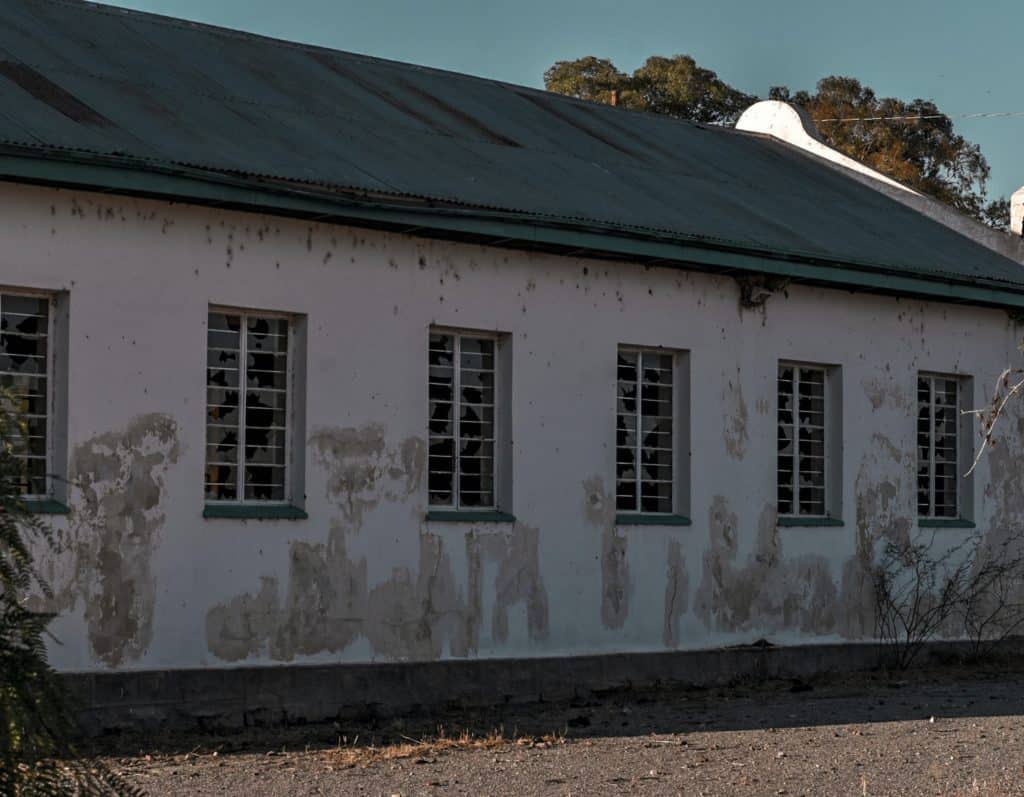
Local church building
All the local buildings and homes were made from concrete cinder blocks connected by rebar for the walls.
The roof was simply wooden beams with corrugated zinc sheets laid across. The nails that were used to attach the zinc to the beams created openings for the rusting process to begin, so holes were not uncommon.
Any roof over three years old was bound to have a couple dripping spots where the corrosion from the humid climate and frequent rainstorms had created a hole. A basin or bowl would be set to catch drips until the owner could afford a new zinc sheet. The floor of the church was red-colored concrete, polished frequently with red floor polish to a shine.
Arrival at church
We unpacked ourselves from the minibus along with the other fifteen people who had driven with us, and took our seats in the front row of wooden benches.
My parents always sat in a front row, even when we lived in the United States before becoming missionaries. I was used to it, so I did not question it. Not that I questioned their decisions aloud anyway. I had long ago found that to be a fruitless endeavor which could only lead to me getting in trouble.

I pulled out my head covering and tied it on. Women were required to wear these due to a literal interpretation of First Corinthians 11, and mine was a lacy triangular bandanna shape.
I preferred to tie mine on so that it wouldn’t slip off partway through the service. Mom’s disapproving comment was that this made me look like a pirate. But she didn’t force me to wear it differently, thankfully.
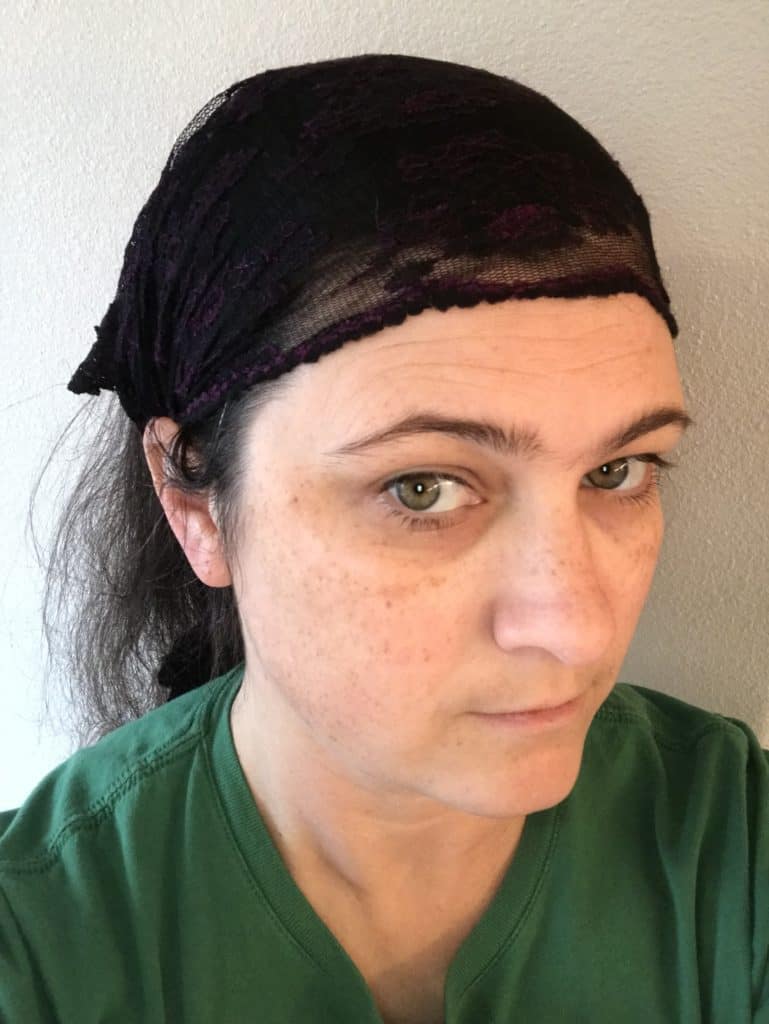
Singing
The hard wooden bench creaked as we sat down, and the song leader called out a chorus for the congregants to begin singing. Everyone joined in enthusiastically, even my family, although we were still learning many of the choruses and songs.
Our hesitation stemmed from the fact that the songs were sung completely from memory! No overhead projector or hymnbooks were available with the printed words (due to expense and frequent flooding which destroyed printed materials).
Many of the older church members could not read because they had limited schooling, so our local churchgoers, like many others in the Jamaican countryside, could sing dozens of songs from memory.
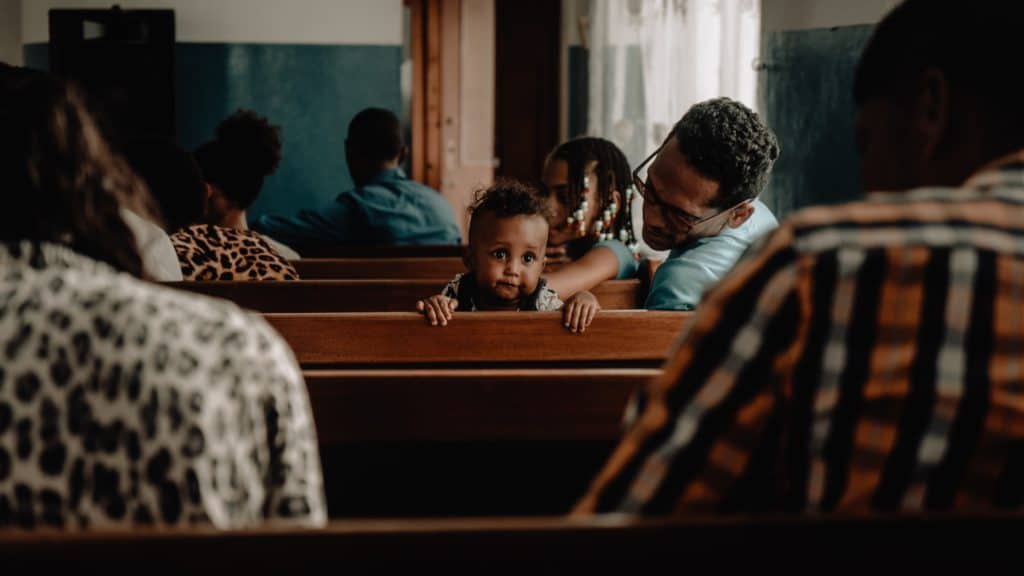
The singing was vibrant, loud, and joyful. It was my favorite part of any church service, and especially since our arrival in Jamaica.
There was the occasional off-key singer, but most Jamaicans in the local churches sang at twice the volume of our American churchgoers, and with beautiful harmony, accompanied by exuberant clapping whenever appropriate.
“We are Happy People”, “Smile Awhile and Give Your Face A Rest”, “Won’t You Greet Somebody?”: with songs like these, it was hard not to finish singing in a better mood than I had started!
Rain in the tropics
Then the preaching started, and with it, the rain arrived. It started as a light patter, but within minutes it was a total downpour, which almost completely drowned out the preaching.
The glass louvered windows were rapidly shut to prevent the water from coming inside. Even though we could barely hear what was being said over the thunderous rain on the zinc roof, there was no point in leaving while it rained so heavily, so the preacher continued.
My mind wandered, unable to concentrate on the preaching. I distracted myself by looking out the windows at the water streaming down the road just a few feet from the building. These tropical rainstorms fascinated me, having spent my first ten years of life in dry Southern California where rain was uncommon.
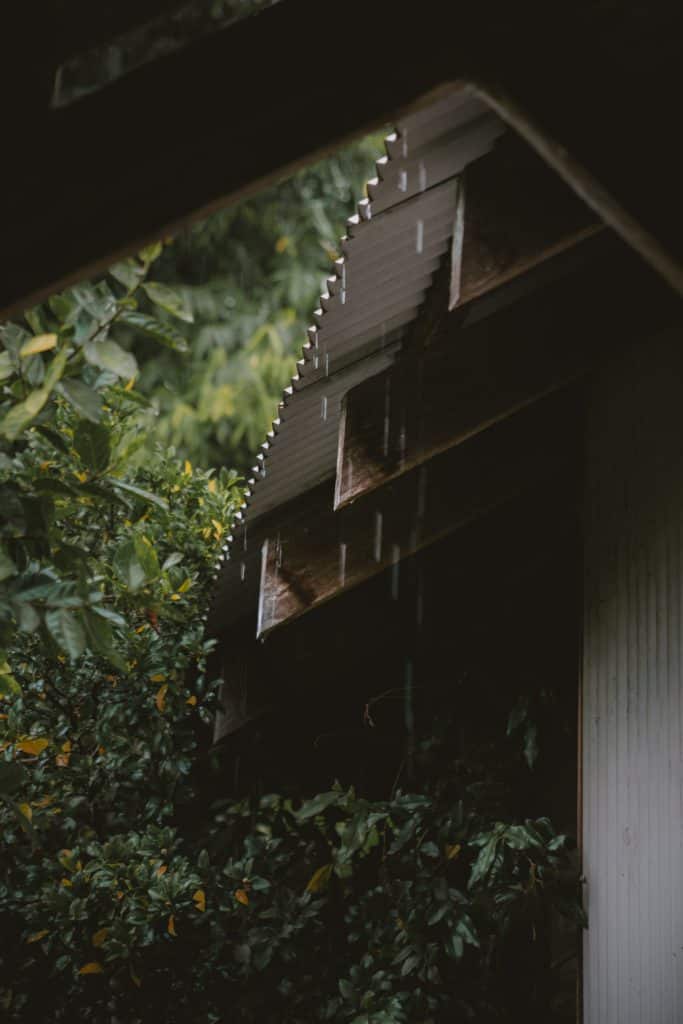
The rain had lessened somewhat to a steady stream around the time that the preaching ended. The final prayer was offered, and I spent a few minutes chatting with the older folks. We were often the only children in attendance at night, so there was no one else to talk to except my siblings.
Dad took one small busload of people, who lived nearest to the church, home while we waited. Then Dad returned for the rest of us who were still at the church building. Picking my way carefully through the muddy grass, I climbed into the bus along with everyone left for the drop-offs and we drove off.

Homecoming
I was always tired upon arriving home, since it was already close to nine o’clock. Getting to school on time each day required a five o’clock wakeup, so I was eager to get in and get ready for bed.
Dad pulled the van into the car port, and we all walked around to the front door. As Dad fiddled with the door lock, I was already thinking about what I needed to do to get in bed quickly.
Thank goodness the electricity is still on! I thought to myself. Rain often caused the power to go out, leaving us in darkness for anywhere from a few minutes to several hours. That would have meant no water pressure either, so my habitual evening shower would have been impossible.
A shocking discovery
Dad opened the door and switched on the light, stepping inside as the rest of us followed close behind. His shout of amazement stopped us all in our tracks.
“What on earth?!” He was flabbergasted.
The entire floor of our house was moving!
Thousands of red ants, locally referred to as “peggy” ants, covered the floors, moving this way and that. They were everywhere, more ants than I had ever seen before in my whole life!
These were not the common, nearly transparent, sugar ants that were ubiquitous inside every Jamaican home.
These peggy ants were huge in comparison, nearly half an inch in length, with wickedly large jaws that could pinch a person until they drew blood. A single ant could easily be brushed off before it bit, but in large numbers it was best to avoid them altogether.
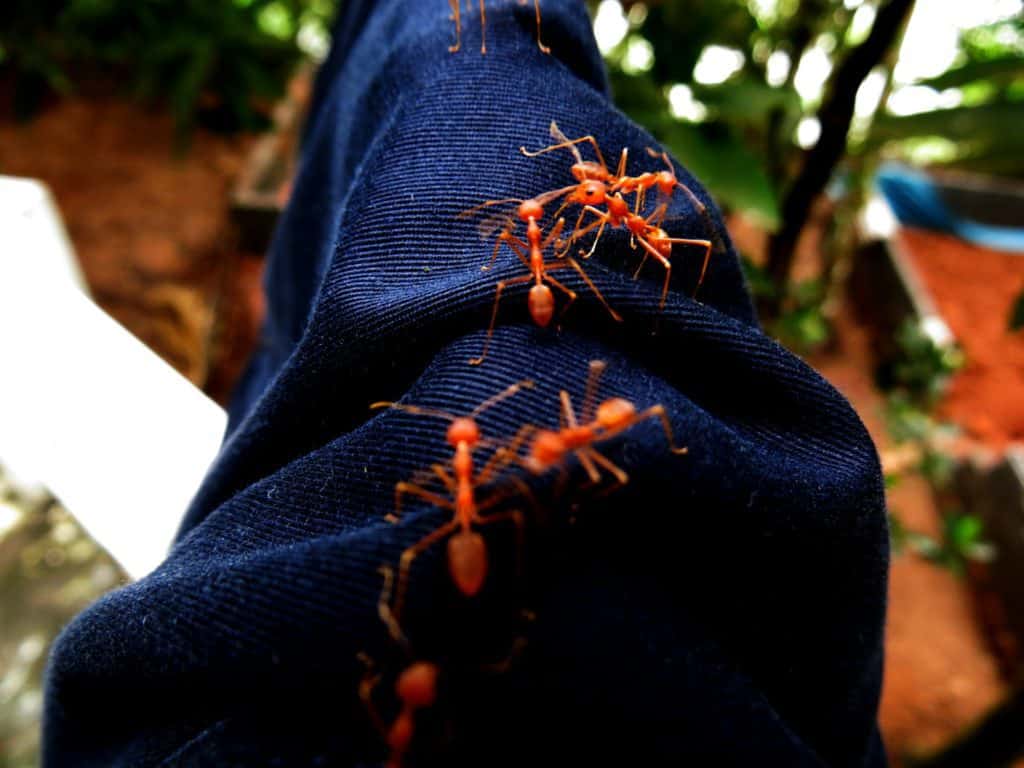
We all stood on the veranda for a minute, unsure how to proceed. This had never happened to us before, even with how frequently it rained!
My dad set down his briefcase on the veranda settee and started to carefully make his way inside. Although the ants crunched underneath his Sunday patent leather shoes, they did not climb up him.
He made his way over to the kitchen and turned on several other lights.
Ants Everywhere
For some reason, although the floor was covered with the peggy ants, they were not climbing up the furniture, or going after the food. They just walked all over the floor, as though they were somewhat confused at this new, dry building.
“I guess the rain must have driven them inside,” Dad said. “Maybe their nest flooded?”
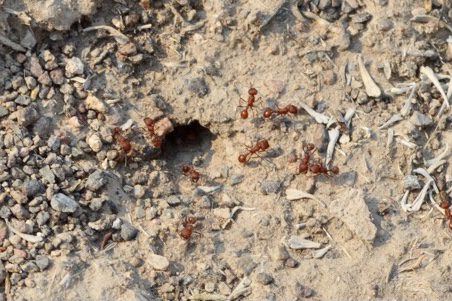
He went to the storage room and brought out a broom and began sweeping. We children hesitated, not wanting to risk getting too close to the ants. Mom crunched in and found a second broom, joining Dad in the sweeping.
When I saw that the ants were not trying to climb up us, I came inside too, and my brothers and sister followed. I set Beth on a chair in the dining room near Mom, and went to our shared bedroom.
Crunch, crunch, crunch, crunch went the ants I smashed as I walked. If I moved quickly the ants did not try to climb me. Crunch crunch crunch I heard as my brothers went to their bedroom. Ants everywhere in their room, too.
Evicting the ants
Dad was simply sweeping them out the door in great piles. The ants clambered over each other, but they were not moving quickly enough to climb the broom handle and bite Dad. Some of the ants clamped onto the broom bristles, angrily attacking this perceived enemy.
I remembered reading somewhere that some ants had been used as a type of skin suture among some South American tribes. The natives would take an ant, allow it to clamp the skin shut, then pop off the body, leaving the head intact as a kind of skin stitch substitute.
I didn’t know if it was true, but seeing how those ants clung to the broom bristles even after they were dead, I could believe it!
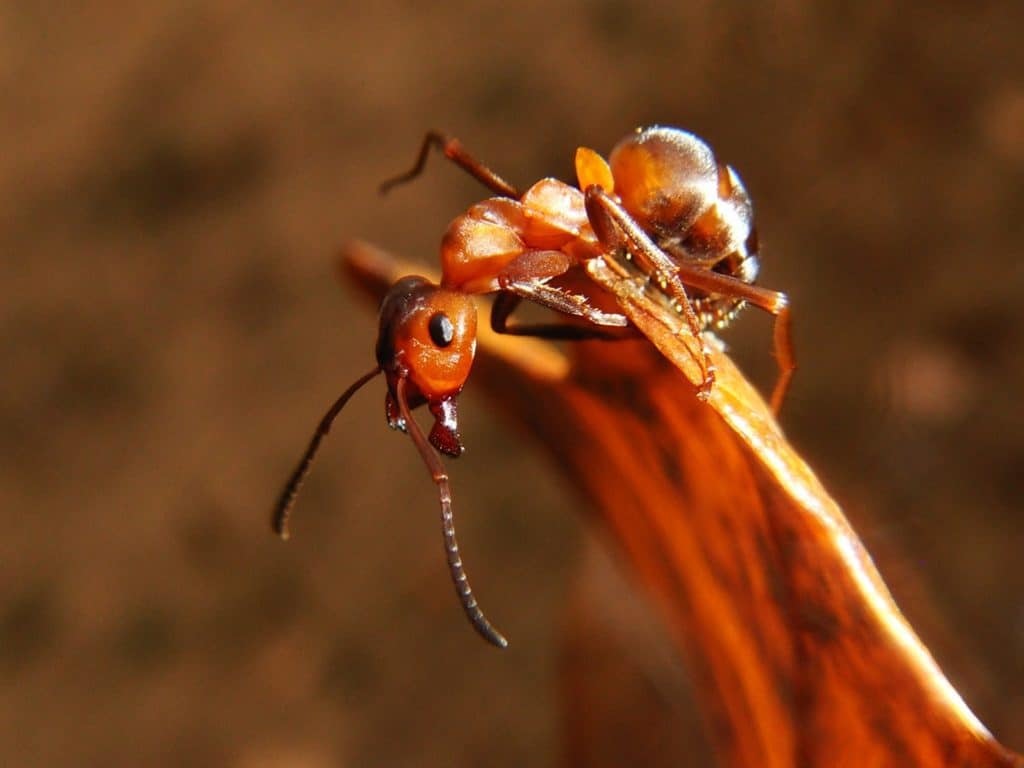
Mom was sweeping the dead ants up into her dustpan and dumping them outside now. After about 30 minutes, most of the ants had been forcibly removed from our house. We tried to go about our evening routines as usual.
More ants to come?
It was still raining, and I wondered if I would wake up in the middle of the night surrounded by ants. Or worse, covered in them! After tossing and turning in my bed, I finally managed to doze off. I slept fitfully, but no ants returned.
The next day Mom and Dad described our ant visit to some neighbors, and they confirmed that this occasionally happened when it rained heavily. Our neighbors seemed mostly unbothered, and since we were all unharmed, I was able to eventually stop worrying about that each time it rained.
The ants only invaded our house that one time in the eight years we lived in Jamaica. I will never forget the feel of them crunching beneath my church shoes that night. I still shudder at the thought!
© Copyright 2021 Jennifer D. Warren
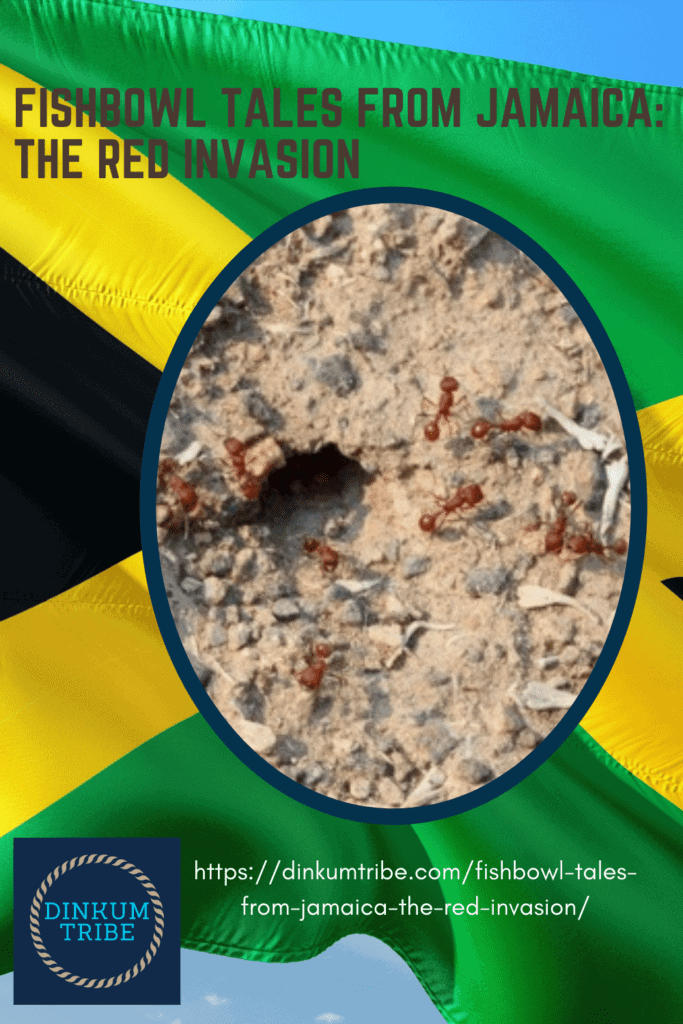




Your story is very interesting! I honestly didn’t know ants can be this scary. Thank you for sharing your story with us x
Thanks for reading it!
Interesting!! I am so fascinated to read about lives of other country and their stories.
Agree. It’s fascinating to hear about other places and people!
I would be terrified of all the ants!
Yup, same here. My skin still crawls remembering it.
Wow! That is definitely something to remember! It’s always interesting to hear things that are the “norm” in other places.
Thanks for reading it!
Interesting story! I’m Jamaican but I’ve never heard of red ants being referred to as “Peggy ants” before. So Amazing how there’s still much to learn. I hated the red ants too because if one bute yuh! Dog nyam yuh supper!
Love the Patois! It’s funny because we were in such a rural area of Jamaica, that when I share these stories with Jamaicans from the urban areas of the island, they are often surprised at the country ways compared to the city. “Peggy ants” was probably local to my neighborhood friends.
I absolutely LOVED reading this! It took me back home. Boy do I miss that Caribbean rain and the sound it made on the roof! Yep, hymns are sung from memory back home too. At least that’s how it was years ago! I don’t know if they eventually got some printed copies!
It’s so good to hear that these experiences resonate with you! I know each island, and even each area, has it’s own microcultural differences, but it’s also fun to hear the similarities.